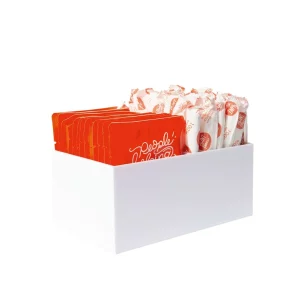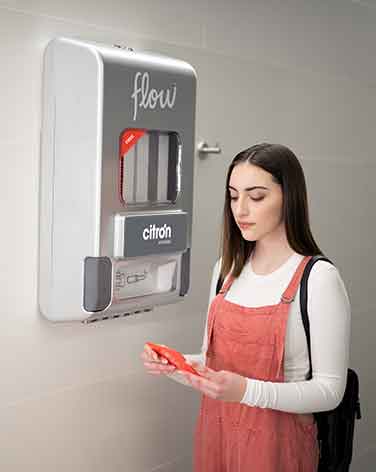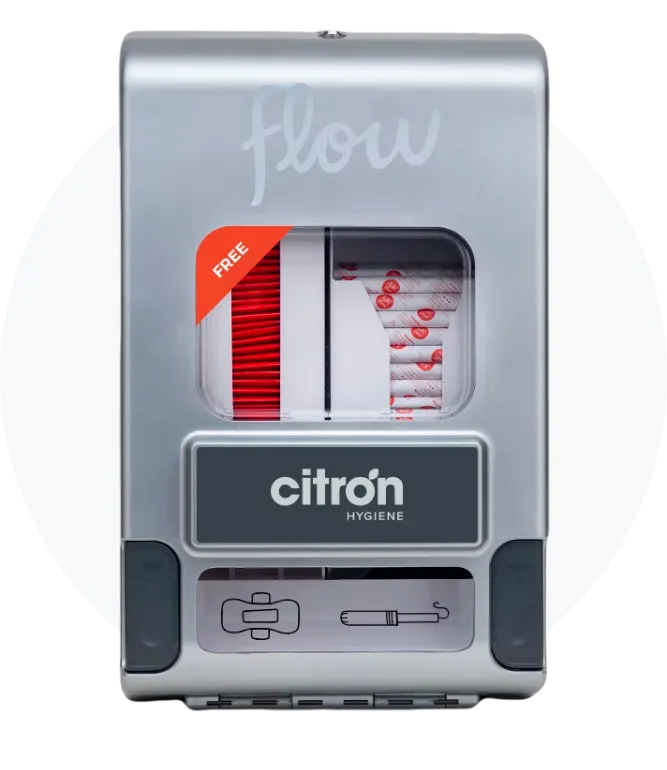The BBC recently published an article discussing the story of a young girl who was forced to take an exam, leaking in her own blood, due to difficulty accessing products to manage her period at school.
With the BBC article stating that 40% of pupils lack access to free period products in school, we take a look at how such situations can be avoided, and the importance of accessible menstrual hygiene products for all.
Table of Contents
Gatekeeping period products
Within the article, Minnie, 13, explains that to access products during her time of the month, she must ‘embarrassingly’ go to the staff office on the top floor to ask. Whilst the head teacher claims this is an opportunity to identify which students need support, in reality, this does quite the opposite, and instead, subjects those in need to potential humiliation, particularly those with learning disabilities, those who are non-verbal or struggle with mental health, who may not be able to ask, or have the confidence to.
Do you also make students approach you for toilet paper and soap? Doing so sends the message that students simply can’t be trusted to manage their own bodily functions. Dignity matters and this does not just apply to adults. Period products should be available in all washrooms when and where they are needed. After all, have you ever seen a public bathroom without toilet paper?
The cost-of-living crisis and period poverty



From fuel prices to more expensive groceries, the cost-of-living crisis has affected more than 63% of menstruators, who have been left unable to afford the products they require to manage their periods while a staggering 62% have cancelled plans as a result of not having adequate sanitary protection.
Therefore, it’s no surprise that the BBC article explains that many learners are relying on free period products from schools to manage their cycles, with our own data finding that 28% of 18-24 year olds have been unable to afford period products due to the cost of living.
So, when educational establishments start to restrict this, it can have a devastating effect on wellbeing. Free period products can enable menstruators to continue their daily activities and attend school, without worrying that they won’t have access to what they need in an emergency.
The effect on marginalised groups
Period poverty can be even more significant amongst marginalised groups including trans youth and those living in poverty at home. For instance, transgender and gender non-conforming people may face safety concerns and often humiliation when forced to menstruate in gendered bathrooms where no sanitary waste bins are available to discreetly dispose of period products.
Sanitary product dispensers are also rarely seen in men’s bathrooms, meaning those in need don’t have access to tampons or pads, subjecting them to go without, or to make the embarrassing walk to the staff office to ask.
Should students even have to ask to go to the washroom at all?
We’ve considered the implications of students having to ask for free period products, but when it comes down to it, should students even have to ask to go to the bathroom at all?
While many schools may need you to ask to go to the toilet as a safety precaution, ultimately, going to the toilet is a human right that needs to be managed properly. One article stated that teachers rightfully get frustrated when they are trying to teach and there is a constant flow of students leaving to go to the toilet, but in this stage of life children are learning to manage their responsibilities and deciding on the appropriate time to use the washroom is part of that.
Allotting this freedom to students forces them to test their personal control and maturity habits, knowing that they will need to make up the work. In general, students should be trusted to go to the washroom without having to ask, whether it is to manage their period, or just to use the toilet. After all, holding in your urine can lead to serious health problems too.
There needs to be changes to current period product legislation
It’s clear that legislation needs to change due to the limitations with the current period product scheme. For instance, the scheme is only in place until 2024 and schools must apply for a budgeted amount of period products. This means, when their allocated budget runs out, they will not be able to obtain free period products under the scheme for the remainder of the academic year. This is particularly an issue for low-income areas where the need for free period products could be greater.
With more than 500 million women and girls across the world lacking access to the facilities they need to manage their periods and with the implications of the cost-of-living crisis, now more than ever legislation should require that products are available in the washrooms of schools across the UK to provide period dignity for all, not just women.



Other ways to break the taboo in schools
Breaking the taboo of periods in school can be a never-ending challenge but should be on every agenda. This can be done at a low cost, by running health classes. Teaching about periods not only has a significant impact on how young people deal with menstruation, but it also helps keep students informed, prepared and safe, regardless of their gender. In one survey, 73% of 18-29 year olds said that boys are not taught enough about menstruation in school.
More education would be a step in the right direction toward breaking the stigma and normalizing menstruation, making it open for discussion with everyone in the classroom.
Support period dignity in your washroom
Provide free menstrual products to your staff & customers
Sanitary hygiene facilities for schools
As an educational establishment, the health and wellbeing of your students and staff should be of top priority. Maintaining a safe and inclusive washroom with sanitary hygiene solutions, can reap extensive benefits to students’ wellbeing, as well as improved reputation and attendance for your school.
Increase period product accessibility with Aunt Flow
The BBC stated that 45 of the 546 students surveyed who had missed school because of their period, didn’t attend due to having no access to period products. Providing free period products in your washrooms is the right thing to do. Even better, a free-vend period product dispenser, such as Aunt Flow. The Aunt Flow Menstrual Hygiene Products Vendor is the most efficient solution to provide free menstrual products to students, staff and visitors. 100% organic cotton, rayon, dye, chemical and plastic free products are safe for students and the planet, while durable dispensers can withstand high-traffic conditions.
Sanitary Waste Bins
Citron Hygiene’s range of touchless, waste disposal bins including the Hygeia sanitary waste disposal unit, ensure a safe and inclusive space for students to dispose of their sanitary waste for discreet and dignified disposal. Get in touch with a member of the team today for a quote.
Remove barriers around period poverty in schools
It’s time to tackle the stigma and remove the barriers school-aged children face surrounding period poverty in schools. Learn more about the impact of period poverty on students and how you can help.

